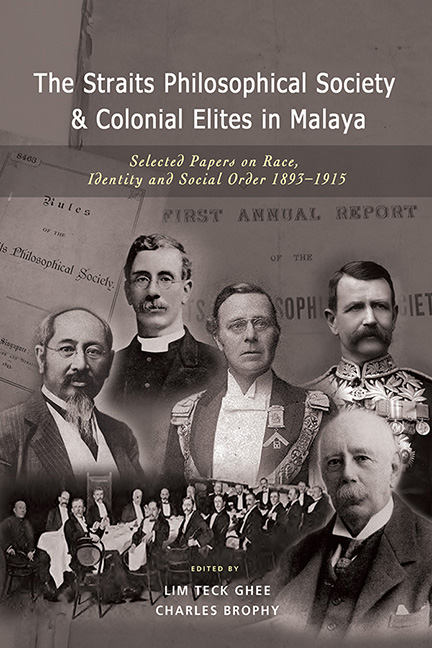 The Straits Philosophical Society and Colonial Elites in Malaya
The Straits Philosophical Society and Colonial Elites in Malaya 5 - The Disadvantages of Education for the Lower Classes
Published online by Cambridge University Press: 09 January 2024
Summary
Editors’ Note
Similarly to Ridley’s contribution of 1900, Gilbert E. Brooke’s paper of 1904 gave emphasis to social Darwinism and the problem of race in Europe and the colonies. Brooke, a doctor and medical officer, referenced the ideas of Herbert Spencer to reject the argument that the lower classes, including the native lower classes in Malaya, should have access to an education which would be beyond their needs. The paper is notable for appearing at a time when discussions on educational reform in the colony were developing, particularly in the Malay States where education had been made compulsory in 1895. And whilst these discussions largely favoured the extension of education to all groups, important debates had emerged around the kind of education that should be provided to rural Malays. Brooke’s paper is notable for its advocacy of social hierarchy and order, as against educational reform, as well as for its comparative discussion of the European and Malayan cases. For Brooke the education of people beyond their station would induce migration to overcrowded cities, lead the lower classes into crime and women into “bad habits”, and produce “neurotic degeneration” in society. So too would it raise people not suited into the station of the middle-class. What was needed then was to move beyond the anarchy of liberal theories of free trade towards an ordered society which he saw as endorsed by “modern social and political economy”.
Tan Teck Soon’s criticism is notable for its support of education as a societal good and his support for the Chinese system of education in the colony. For Tan this was not an abstract debate, but an important matter of social reform. From 1890 to 1894, Tan was the editor and proprietor of the newspaper, Daily Advertiser which kept the Chinese community in Singapore informed of developments in mainland China. He also ran the Singapore Chinese Educational Institute, a night school for working Chinese adults.
- Type
- Chapter
- Information
- The Straits Philosophical Society and Colonial Elites in MalayaSelected Papers on Race, Identity and Social Order 1893-1915, pp. 79 - 92Publisher: ISEAS–Yusof Ishak InstitutePrint publication year: 2023


